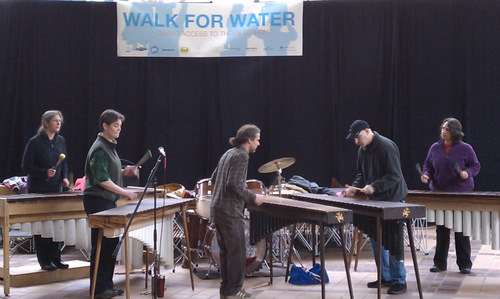Walking for Water in the Rain
 Monday, March 28, 2011 at 11:31AM
Monday, March 28, 2011 at 11:31AM Despite the cold, rainy and windy weather, there was a good turnout for the Walk for Water in downtown Portland yesterday. The official figures are not in yet, but from my estimation, approximately 800 people gathered at the covered plaza at the World Trade Center to take part. We were there to raise money to build a well in a village in either Kenya or Malawi.
Walkers enjoyed free coffee from Portland Roasting and some snacks provided by local businesses. Five members of Boka Marimba, a marimba and percussion group, enthusiastically entertained the crowd with their energetic music.
 Boka Marimba
Boka Marimba
Several non-profit groups also set up informational booths to let people know what they were up to and to sign up new members. Upon seeing the booth for PHLUSH, an organization that campaigns for the construction of more public toilets in Portland, Bill Mikesell, who was photographing the event, quipped that “in Portland, even the public toilets have an advocacy group.”
Of course they do. . . is that weird?
Just before we got the go ahead to start the walk, Dr. Catherine Howells, a “professor of tap water” at Portland State, spoke for a few minutes about the importance of public water systems. She reminded the crowd that having a source of water in every home that is “clean, cool, consistent and cheap” (the four C’s of good public water) is an idea that is relatively new in the history of the world.
 Dr. Catherine Howells
Dr. Catherine Howells
“It is one of the public health miracles of the 20th century,” she said. “Without water, there would be no cities.”
After hearing about the importance of clean water, it was time to walk. About the time we left the cover of the plaza, the rain picked up its intensity. Soon it was not just a shower, but a deluge. Not a great thing for someone who did not have an umbrella or a hood.
The 3.1-mile route started at the World Trade Center and followed the west side of the Willamette River to the Steel Bridge, where it crossed and came back up the east side to the Hawthorne Bridge. Participants stopped at five stations along the course. At each one, we had to answer a question or two in order to get our passports stamped. The goal was to educate people about some of the health and economic issues associated with water. For example, at one station we were given two minutes to read information about a water-borne illness and then had to explain what the symptoms of the disease were in order to get our stamps.
The first leg of the walk was just a casual stroll in the rain—we didn’t pick up the water until the second station, located under the Morrison Bridge.
 Choose your bucket
Choose your bucket
From there, the walk became more of a chore and each group shared the water burden differently. Some people worked in teams to carry their water, alternating who carried it. Others shared the burden, and some, like your author, elected to carry water by themselves.
 Sharing the burden
Sharing the burden
About half way through the walk, my arms started to get tired. The bucket probably weighed about 35 lbs., which does not sound like that much, but over time, the awkwardness of carrying a large water bucket begins to weigh you down.
 It gets heavy after a while
It gets heavy after a while
Fortunately, as my arms started to get tired, the rain cleared up. It was still cool and windy, but at least the rain stopped coming down in sheets. On the home stretch, crossing over the Hawthorne bridge, a couple of boys who looked to be about twelve years old offered to carry my bucket. They said they were trying to beat their cousins back to the start, and apparently they needed a bucket of water to make their efforts legitimate. Maybe they just thought I looked tired. Whatever their motivation, I accepted their offer. I had carried the bucket about 2.5 miles and it was fine with me if someone else wanted to take a turn.
 Proof that I made it to all the stations
Proof that I made it to all the stations
After the walk, I spoke with Suzanne Strick, marketing manager at Portland Roasting. She was pleased with the turnout and with how the event had gone, despite the rain.
“It went great. Three months of planning and it’s all over in about three hours,” she told me with a big smile.
Later, I stopped in at Park Avenue Café to do some writing. When I explained to the baristas why I was soaked, one of them laughed and commented that the rain was appropriate because it “really makes you think about the water.” I suppose she was right, but the rain did not make me think about water shortages.
In fact, getting people to think about water shortages is a challenge in a place like Portland, where it seems like there is water everywhere. We are fortunate to have a great water supply that is so accessible, but many people around the world are not so lucky.
When people have to routinely walk three miles to carry water, they lose a lot of time that they could use for other things, especially education, an important component of economic development. Building wells in villages so that people do not have to spend so much time walking for water makes a real difference in peoples’ lives.
Nice work, Portland. You braved the rain and came out for a good cause. If you didn’t, maybe we’ll see you there next year.



Reader Comments